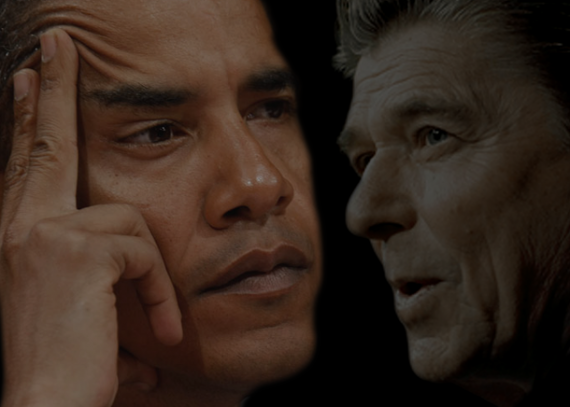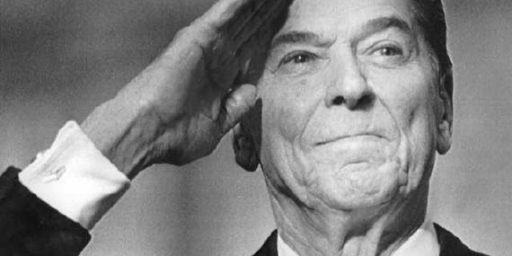Obama Revives The Reagan Doctrine
My latest for The National Interest, "Obama Doctrine, Reagan Doctrine," is out.
My latest for The National Interest, “Obama Doctrine, Reagan Doctrine,” is out. Its core argument:
Charles Krauthammer dubbed this “overt and unashamed American support for anti-Communist revolution” the Reagan Doctrine in a Time magazine essay. Its essence was use of proxies rather than direct American intervention. If a legitimate popular uprising was taking place against a communist regime in the developing world, Reagan reasoned that it was both morally right and in America’s interests to help it with arms and material support.
President Obama has quietly adopted a similar strategy, one using NATO allies, France in particular, as a proxy. First, we had the March 2011 intervention in Libya, in which American forces played a heavy role in the initial strikes, providing our “unique capabilities,” but then quickly transitioned to a supporting role, providing suppression of enemy air defense; intelligence, surveillance, and reconnaissance; and air-to-air refueling assets to enable the mission. We appear to be on a similar path in Mali, quietly providing combat enablers in a mission with France in the driver’s seat.
Unfortunately labeled as “leading from behind” by a staffer during the Libya intervention, critics have charged the president with weakness—ceding America’s rightful leadership role to others. Viewed through the lens of the Reagan Doctrine, though, it’s prudent risk management.
This isn’t, however, a case where following Reagan is unambiguously good. As I note in the piece, “the original Reagan Doctrine was hardly an unalloyed success story. Most notably, the backing of the anti-communist mercenaries known as the Nicaraguan Contras was a disaster militarily and politically.” My close:
General Colin Powell, an enthusiastic backer of the Reagan Doctrine as Reagan’s national security advisor, famously warned President George W. Bush, whom he served as secretary of state, of the Pottery Barn rule—“You break it, you own it”—during the march to war in Iraq. That surely applies just as well to wars one leads from behind. To the extent that intervention-by-proxy makes interventions less daunting, it will surely lead to more interventions. And to the extent the risk of those interventions is lowered by being in a supporting role militarily, it will surely diminish the focus on the longer-term consequences of said interventions. We haven’t done that well in thinking them through—even when we’re the main force.
There’s quite a bit more in between.







You seem to imply that there might be cases where following Reagan would be a good idea. The man was certainly charismatic and friendly and his rhetoric made us believe in America and shining cities on hills, but across the board from Iran/Contra, to raging deficits, to employer-friendly illegal alien amnesty, his policies were uniquely awful. I am impressed Obama could find a nugget of strategic sanity to emulate among Reagans many failures, but I fear we could end up down the same path if not very careful.
There’s no sense pretending we have an Empire if we don’t get involvd in every pissing contest around the world.
James,
The central goal of the Reagan doctrine was opposition to communism. It was the anti-communist element that gave the Reagan doctrine coherence, the element that tied all the other actions together. What is the central goal of this “Obama doctrine?” What is the element that provides coherence to it beyond a simple observation that both Reagan and Obama use proxies (as if there was a great power in history that didn’t)? You never really say, maybe because such coherence doesn’t exist.
But I also think you miss the mark regarding the proxy comparison. I think France would object to the characterization that it is an American proxy doing our dirty work, the implication that they are little different from our support to various anti-communists groups during Reagan’s time. Plus, France is supporting its own proxy – the Malian government. If we thought Mali was at all important, we could funnel arms and support to the Mali government ourselves. A few better comparisons to Reagan’s use of proxies include our support for the Yemeni government, certain factions in Somalia, the Philippine government, etc. And so the reasons we support France has nothing to do with the utilization of proxies toward some end.
Overall, I think the comparison between what Obama is doing and what Reagan did is rather weak.
We have the resources and technology to provide support. Our main and first objective is to protect our own country. Time and again we have became stuck in the quicksand and mess of other countries. When Marine barracks were bombed in Lebanon, Reagan promptly got the troops out.
Two principles should always run our foreign policy: If you go in, have a plan to win. If you go in, have a plan to get out.
“No terms except unconditional surrender.” General Grant. “Win by attrition” Colonel Troutman
awesome, france is fighting our battles. that just sounds wrong for some reason but wth, let them.
s/Reagan doctrine/Eisenhower doctrine/g
Reagan didn’t have a doctrine IMO.
France is not a proxy to the United States, they have their own interests in Africa. Al Qaeda of the Islamic Magreb is a successor to the GIA, an Argelian Militant group that hijacked a French jet in December of 1994 and that promoted several bombings in France in the 90´s. The Magreb is also a big source of energy production to Europe. Nicolas Sarkozy even offered a nuclear reactor to Morocco and Libya in 2007 in exchange for natural gas, that´s why Berlusconi and Sarkozy were so friendly to Gaddafi.
In fact, the French always wanted to keep their former colonies and other other countries in the region in their spheres of influence: that´s why the French intervened in Ivory Coast. The French also uses their political influence to get economic contracts, usually at the expense of the United States (Sarkozy used his political clout so that India and Brazil would buy French Fighter Jets, at the expense of American jets).
James:
I’m a bit surprised that you now accept that the US led in LIbya. I was arguing at the time that it was our leadership that got the Russians on board at the UN, and that the operation was primarily American from the get-go. I thought you disagreed, though that may have been Doug.
In any case, I don’t see why we’re talking about a strategy “finally” emerging. Mr. Obama said way back in 2008 while running against Mr. McCain that he intended to go after terrorists wherever, whenever and however. In pursuit of that policy he’s used everything from our allies, to drone warfare, to cyber war, to sanctions, to direct US action.
And look at the score. Osama bin Laden dead with no loss of American lives. Muamar Gaddafi dead, no loss of American lives. Iran still not nuclear-capable. Dozens if not hundreds of terrorist leaders and cadre in Somalia, Yemen and Pakistan dead with no loss of American lives. And he knows when not to jump in: Syria.
I think his strategy is pretty simple: I’m going to attack terrorists whenever I can, in whatever way is most effective, while balancing risks and rewards. His anti-terror record easily outshines that of Mr. Bush and Mr. Cheney, who made a great deal more noise, got a whole lot more Americans killed, and managed to piss away a trillion unfunded dollars ding it.
@ bill
Why don’t you go to Africa, punk slap a few of those sissy French paratroops, and show them how it’s done?
This really is a funny main post and underlying article, the sort of thing that only can exist in Internet-academe circles.
Others up in the thread already have addressed the key logical and historical fallacies to the thesis, but it bears repeating that an analogy between supporting in the 1980’s as the top dog proxy anti-communist guerilla or government forces (who were fighting against communist governments or communist anti-government rebels, respectively) and now playing kid brother to the nation of France (who because of the power vacuum is taking a lead role if not the lead role in the fight against Islamic terrorists and terrorist sponsors) doesn’t even meet the basic cognition test. The more apt analogy is that France has adopted the “neocon” doctrine. And that’s not entirely that surprising. They’ve been mugged by reality.
@michael reynolds: My view on Obama’s role in Libya evolved with my understanding of the facts. An off-the-record briefing at the Atlantic Council in May 2011 or thereabouts fundamentally altered my understanding of what went down behind the scenes. Ultimately, I still believe that Obama got dragged into Libya by France and the UK but that, with Gates and others correctly pointing out that a no-fly zone would have been useless, Obama then nudged them into doing much more than a NFZ. Interestingly, for various reasons that I can only guess at, Obama nonetheless kept up the public facade that the US was there only reluctantly and in a supporting role; the latter, especially, was a sham. (And I understood that contemporaneously.)
I think Libya was about Responsibility to Protect, not counterterrorism. That Gaddafi had sponsored anti-American terrorism while Obama was in law school may have been icing on the cake, but I don’t think he’d have committed force on that basis.